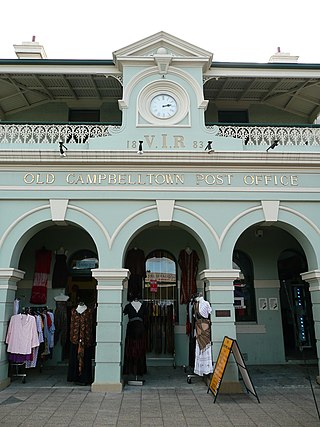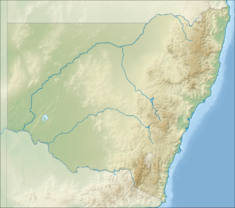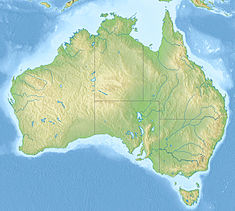
Lithgow railway station is a heritage-listed former station master's residence and railway station located on the Main Western line at Railway Parade, Lithgow, City of Lithgow, New South Wales, Australia. It was designed and built by New South Wales Government Railways and built from 1924 to 1925. It is also known as Lithgow Railway Station Group and Residence and Eskbank East. The property was added to the New South Wales State Heritage Register on 30 August 2013. The station has frequent NSW TrainLink services running to and from Sydney Central.

The Commercial Bank of Australia Building is a heritage-listed former telegraph office and bank and now commercial premises at 164 Beardy Street, Armidale, in the New England region of New South Wales, Australia. It was designed by NSW Colonial Architect's Office and built from 1882 to 1885 by C.T. Cook. It is also known as Comfort Lodge. The property is owned by Joe Barbato Pty Ltd (Private). It was added to the New South Wales State Heritage Register on 2 April 1999.

CBC Bank Building is a heritage-listed former bank building and now residence at 21 Auckland Street, Bega, in the South Coast region of New South Wales, Australia. It was built from 1865. The property is owned by the Bega Valley Shire Council. It was added to the New South Wales State Heritage Register on 2 April 1999.

The Balgowlah Substation is a heritage-listed former electrical substation and now child care centre located at 83 Griffiths Street, Balgowlah, New South Wales, a suburb of Sydney Australia. It was built in 1928. It is also known as #15003 Balgowlah 33 kV Zone Substation. The property is owned by Ausgrid, a privately owned energy utility company. The property was added to the New South Wales State Heritage Register on 2 April 1999.
The Tamworth Peel Barracks is a heritage-listed historic site located at 214 Peel Street, Tamworth, Tamworth Regional Council, New South Wales, Australia. The property is owned by Tamworth Regional Council and was added to the New South Wales State Heritage Register on 2 April 1999.

Cobar Post Office is a heritage-listed post office at 47 Linsley Street, Cobar, New South Wales, Australia. It was designed by James Barnet in 1885. It was added to the Australian Commonwealth Heritage List on 22 August 2012.

The Pymble Substation is a heritage-listed electrical substation at 982–984 Pacific Highway, in the Sydney suburb of Pymble, in the Ku-ring-gai Council local government area of New South Wales, Australia. It was built from 1926 to 1928. It is also known as #195 Pymble 33KV Zone/Depot. The property is owned by Ausgrid, an agency of the Government of New South Wales. It was added to the New South Wales State Heritage Register on 2 April 1999.

The Campbelltown Post Office is a heritage-listed former post office and now shops and office space at 261 Queen Street, Campbelltown, New South Wales, a suburb of Sydney, Australia. It was designed by James Barnet and built in 1881. It is also known as Campbelltown Post Office (former). The property is privately owned. It was added to the New South Wales State Heritage Register on 2 April 1999.
Singleton Post Office is a heritage-listed former post office at 25–27 George Street, Singleton, Singleton Council, New South Wales, Australia. It was added to the New South Wales State Heritage Register on 2 April 1999.

Science House is a heritage-listed commercial building located at 157–169 Gloucester Street and Essex Street, in the inner city Sydney suburb of The Rocks in the City of Sydney local government area of New South Wales, Australia. It was designed by Peddle Thorp & Walker Architects and built in 1930 by John Grant and Sons, Master Builders. It was also known as Sports House from 1978–1991. The building is owned by Denwol, a property group owned and controlled by Phillip Wolanski AM. It was added to the New South Wales State Heritage Register on 10 May 2002.

105 George Street, The Rocks is a heritage-listed shop and former residence located at 105 George Street, in the inner city Sydney suburb of The Rocks in the City of Sydney local government area of New South Wales, Australia. It was built during 1851 by persons unknown and redeveloped in 1985 by the Sydney Cove Redevelopment Authority with Co-Wyn Construction. It is also known as Kathmandu (current) and Beach Culture and Dorian Scott (former). Property NSW, an agency of the Government of New South Wales. It was added to the New South Wales State Heritage Register on 10 May 2002.

18 Merriman Street, Millers Point is a heritage-listed residence located at 18 Merriman Street, in the inner city Sydney suburb of Millers Point in the City of Sydney local government area of New South Wales, Australia. It was added to the New South Wales State Heritage Register on 2 April 1999.

Undercliffe Terrace is a heritage-listed row of terrace houses located at 52–60 Argyle Place, in the inner city Sydney suburb of Millers Point in the City of Sydney local government area of New South Wales, Australia. The property is also known as Grimes' Buildings. was added to the New South Wales State Heritage Register on 2 April 1999.

60–62 Kent Street, Millers Point are heritage-listed terrace houses located at 60–62 Kent Street, in the inner city Sydney suburb of Millers Point in the City of Sydney local government area of New South Wales, Australia. It was added to the New South Wales State Heritage Register on 2 April 1999.

56–58 Kent Street, Millers Point are heritage-listed terrace houses located at 56–58 Kent Street, in the inner city Sydney suburb of Millers Point in the City of Sydney local government area of New South Wales, Australia. The property was added to the New South Wales State Heritage Register on 2 April 1999.

32–40 Kent Street, Millers Point are heritage-listed terrace houses located at 32–40 Kent Street, in the inner city Sydney suburb of Millers Point in the City of Sydney local government area of New South Wales, Australia. The property was added to the New South Wales State Heritage Register on 2 April 1999.

The Skinners Family Hotel is a heritage-listed former pub and now retail optometrist shop, located at 296 George Street, in the Sydney central business district, in the City of Sydney local government area of New South Wales, Australia. It was added to the New South Wales State Heritage Register on 2 April 1999.

Hawken and Vance Produce Exchange is a heritage-listed commercial building facade at 95–99 Sussex Street, Sydney, City of Sydney, New South Wales, Australia. It was built in 1883, with the remainder of the building apart from the facade being demolished in 1989. It was added to the New South Wales State Heritage Register on 2 April 1999.

International House is a heritage-listed commercial building at 14-16 York Street, in the Sydney central business district, in the City of Sydney local government area of New South Wales, Australia. It was designed by Robertson & Marks and built during 1913 by Howie, Brown & Moffat, Master Builders. It is also known as Pomeroy House. It was added to the New South Wales State Heritage Register on 2 April 1999.

The Bulletin Place Warehouses are a series of three heritage-listed former warehouses and now souvenir sales office, commercial offices, health club, storage area, and restaurant located between 6–18 Bulletin Place, in the Sydney central business district in New South Wales, Australia. The warehouses were built from 1880 and have variously been known as the San Francisco Restaurant. The property is privately owned. It was added to the New South Wales State Heritage Register on 2 April 1999.
























